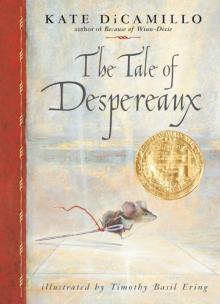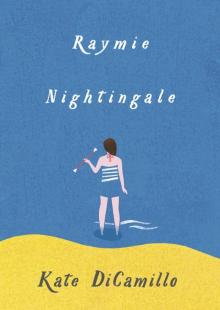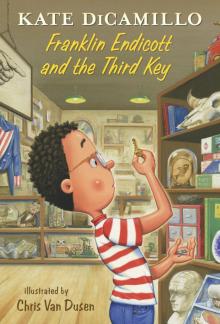- Home
- Kate DiCamillo
Beverly, Right Here
Beverly, Right Here Read online
One
Two
Three
Four
Five
Six
Seven
Eight
Nine
Ten
Eleven
Twelve
Thirteen
Fourteen
Fifteen
Sixteen
Seventeen
Eighteen
Nineteen
Twenty
Twenty-One
Twenty-Two
Twenty-Three
Twenty-Four
Twenty-Five
Twenty-Six
Twenty-Seven
Twenty-Eight
Twenty-Nine
Thirty
Thirty-One
Thirty-Two
Thirty-Three
Thirty-Four
Thirty-Five
Thirty-Six
Buddy died, and Beverly buried him, and then she set off toward Lake Clara. She went the back way, through the orange groves. When she cut out onto Palmetto Lane, she saw her cousin Joe Travis Joy standing out in front of his mother’s house.
Joe Travis was nineteen years old. He had red hair and a tiny little red beard and a red Camaro, and a job roofing houses in Tamaray Beach.
Beverly didn’t like him all that much.
“Hey,” said Joe Travis when he saw Beverly.
“I thought you moved to Tamaray,” said Beverly.
“I did. I’m visiting is all.”
“When are you going back?” she said.
“Now,” said Joe Travis.
Beverly thought, Buddy is dead — my dog is dead. They can’t make me stay. I’m not staying. No one can make me stay.
And so she left.
“What are you going to Tamaray for?” said Joe Travis. “You got friends there or something?”
They were in the red Camaro. They were on the highway.
Beverly didn’t answer Joe Travis. Instead, she stared at the green-haired troll hanging from the rearview mirror. She thought how the troll looked almost exactly like Joe Travis except that its hair was the wrong color and it didn’t have a beard. Also, it seemed friendlier.
Joe Travis said, “Do you like ZZ Top?”
Beverly shrugged.
“You want a cigarette?” said Joe Travis.
“No,” said Beverly.
“Suit yourself.” Joe Travis lit a cigarette, and Beverly rolled down the window.
“Hey,” said Joe Travis. “I got the AC on.”
Beverly leaned her face into the hot air coming through the open window. She said nothing.
They went the whole way to Tamaray Beach with one window down and the air-conditioning on full blast. Joe Travis smoked six cigarettes and ate one strip of beef jerky. In between the cigarettes and the beef jerky, he tapped his fingers on the steering wheel.
The little troll rocked back and forth — blown about by gusts of air-conditioning and wind, smiling an idiotic smile.
Why were trolls always smiling, anyway?
Every troll Beverly had ever seen had a gigantic smile plastered on its face for absolutely no good reason.
When they got to the city limits, Beverly said, “You can let me out anywhere.”
“Well, where are you headed?” said Joe Travis. “I’ll take you there.”
“I’m not going anywhere,” said Beverly. “Let me out.”
“You don’t got to be so secretive. Just tell me where you’re going and I’ll drop you off.”
“No,” said Beverly.
“Dang it!” said Joe Travis. He slapped his hand on the steering wheel. “You always did think that you was better than everybody else on God’s green earth.”
“No, I didn’t,” said Beverly.
“Same as your mother,” said Joe Travis.
“Ha,” said Beverly.
“You ain’t,” said Joe Travis. “Neither one of you is any better. You ain’t better at all. I don’t care how many beauty contests your mama won back in the day.” He stomped on the brakes. He pulled over to the side of the road.
“Get out,” said Joe Travis.
“Thanks for the ride,” said Beverly.
“Don’t you thank me,” said Joe Travis.
“Okay,” said Beverly. “Well, anyway — thanks.” She got out of the Camaro and slammed the door and started walking down A1A in the opposite direction of Joe Travis Joy.
It was hot.
It was August.
It was 1979.
Beverly Tapinski was fourteen years old.
She had run away from home plenty of times, but that was when she was just a kid.
It wasn’t running away this time, she figured. It was leaving.
She had left.
Beverly walked down the side of A1A. She had on an old pair of flip-flops, and it didn’t take long for her feet to start hurting. Cars went zooming past her, leaving behind hot gusts of metallic air.
She saw a sign with a pink seahorse painted on it. She stopped. She stared at the seahorse. He was smiling and chubby-cheeked. There were a lot of little bubbles coming out of his mouth, and then one big bubble that had the words SEAHORSE COURT, AN RV COMMUNITY written inside of it.
Past the sign, there was a ground-up seashell drive that led to a bunch of trailers. A woman was standing in front of a pink trailer holding a hose, spraying a sad bunch of flowers.
The woman raised her hand and waved. “Howdy, howdy!” she shouted.
“Right,” said Beverly. “Howdy.”
She started walking again. She looked down at her feet. “Howdy,” she said to them. “Howdy.”
She would get a job.
That’s what she would do.
How hard could it be to get a job? Joe Travis had done it.
After the Seahorse Court, there was a motel called the Seaside End and then there was a restaurant called Mr. C’s.
MR. C’S IS YOUR LUNCH SPOT! said the sign. WE COOK YOU ALL THE FISH IN THE C!
Beverly hated fish.
She walked across the blacktop parking lot. It was almost entirely empty. She went up to the restaurant and opened the door.
It was cool and dark inside. It smelled like grease. And also fish.
“Party of one?” said a girl with a lot of blond hair. She was wearing a name tag that said Welcome to Mr. C’s! I’m Freddie.
From somewhere in the darkness, off to the left, there came the ping and hum of a video game.
“I’m looking for a job,” said Beverly.
“Here?” said Freddie.
“Is there a job here?”
“Mr. Denby!” shouted Freddie. “Hey, someone out here wants a job. Who knows why.”
Beverly looked to the right, past Freddie. She could see a dining room with blue chairs and blue tablecloths, and a big window that looked out on the ocean. The brightness of the room, the blueness of it, hurt her eyes.
She remembered, suddenly, that Buddy was dead.
And then she wished she hadn’t remembered.
“Forget it,” she said out loud.
“Forget what?” said Freddie. “We’re getting ready to close, anyway. This is just a lunch restaurant.” And then she shouted again, “Mr. Denby! Hey, Mr. Denby!” She rolled her eyes. “I guess I have to do everything around here.”
She walked off down the dark hallway. A minute later, she was back. A man with a mustache was walking behind her. There was a red crease on the man’s forehead, and he had on a gigantic tie imprinted with little yellow fish.
“This is Mr. Denby,” said Freddie. “He was asleep. Can you believe it?”
Mr. Denby blinked.
“He had his head down on the desk and everything,” said Freddie. “He was snoring.”
<
br /> “I was not snoring,” said Mr. Denby. “I was not sleeping. I was resting my eyes. Paperwork is hard on the eyes. Freddie says that you want a job.”
“Yes,” said Beverly.
“Well, we do need someone to bus tables. I’ll have to interview you, I suppose.”
“What’s your name?” said Freddie.
“Beverly,” said Beverly.
“I’ll get right on it, Mr. Denby,” said Freddie.
“You’ll get right on what?” said Mr. Denby. He rubbed at the red mark on his forehead.
“You spell Beverly with a B, right?” said Freddie.
“Right,” said Beverly.
“Follow me,” said Mr. Denby.
The video game pinged and chortled. Mr. Denby headed down the dark hallway.
Beverly wasn’t a big fan of following people.
But Buddy was dead.
What mattered now?
Not much.
Nothing really.
She followed Mr. Denby.
The office smelled like fish and cigarette smoke. It had a big desk and three metal filing cabinets. The desk was piled high with stacks of paper. There was a fan balanced on one of the stacks.
“There’s a lot of work to do around here,” said Mr. Denby. He waved his hand in the general direction of the desk. “As you can see.”
Beverly nodded.
“So I need someone with a good, strong work ethic,” said Mr. Denby. “I need someone who believes in getting things done.”
He reached out and turned on the fan.
The top layer of papers blew off the desk.
“Shoot,” said Mr. Denby. “Do you see what I’m talking about here?” He turned the fan off and moved it to the floor. The papers fluttered and sighed. Mr. Denby sat down at the desk. He folded his hands.
“Sit down,” he said. He nodded in the direction of an orange plastic chair. Beverly sat down.
Mr. Denby looked at her. “Let’s see,” he said. “Have you ever worked in a restaurant before?”
“No,” said Beverly.
“Do you like fish?”
“Not really,” said Beverly.
Mr. Denby sighed.
“I have three kids,” he said. “Three girls. They’re in Pennsylvania. With their mother.”
Beverly nodded.
“It’s a tragedy, having kids,” said Mr. Denby. “Don’t let anybody tell you any different.” He stared at his hands. “What happens with kids is you want to protect them, and you can’t figure out how to do it, and it drives you crazy. It drives you right out of your head. It keeps you up nights.”
“Uh-huh,” said Beverly.
She doubted that her mother had ever stayed up at night thinking about how she could protect anybody.
“How old are you?” said Mr. Denby.
“Sixteen,” said Beverly.
Mr. Denby put his head down on the desk. And then he lifted it and looked at her. “Sixteen,” he said. “I can’t stand it.” He put his head back down.
Freddie came into the office.
Mr. Denby raised his head again.
“Freddie,” he said, “how old are you?”
“Why do we have to keep talking about this?” said Freddie. “I’m a high-school graduate. I walked across the stage and everything. Besides, you shouldn’t talk to ladies about their age. It’s rude. Here,” she said.
She handed Beverly a name tag that said Welcome to Mr. C’s. Underneath that was a piece of tape with white letters that said I’m Beveryl.
“Wow,” said Beverly. “Thanks a lot.”
“Making name tags is something that I’m just naturally good at,” said Freddie. “Plus, I like using that little machine. It’s like a wheel. You just find the right letter on the wheel, and you punch it down hard, wham, and a letter appears. It’s like magic.”
Mr. Denby said, “Margaret, Alice, and Anne. Those are the names of my girls. Someday one of them will go into a restaurant and lie to a man about how old she is. It makes me sad. But what can I do? What am I expected to do? I’ve got a business to run here. I’ve got mouths to feed. You can start tomorrow.”
“But she’s not waiting tables, right?”
“No, Freddie,” said Mr. Denby. “She’s not waiting tables. She’ll bus tables. Have you ever bused tables, Beverly Anne?”
“No,” said Beverly. “And my name is Beverly. Just Beverly.”
“Right,” said Mr. Denby.
“Anyone can bus tables,” said Freddie. “Anyone can learn how to do that. It’s not like it’s a skill or anything.”
“Great,” said Beverly.
“It’s not fun here,” said Freddie. “You have to have a dream and work to keep it alive because it’s not any fun at all doing this job.”
“No one said it would be fun,” said Mr. Denby. “It’s a fish restaurant. Not an amusement park.”
“Okay, well,” said Freddie, “I’m only warning her.”
“Good-bye, Freddie,” said Mr. Denby.
“I’m telling you: you have to have a dream,” said Freddie. She opened her eyes very wide.
“Good-bye, Freddie,” said Mr. Denby again. He stood up.
Beverly stood up, too. “Thank you, I guess,” she said.
“Sure,” said Mr. Denby. He held out his hand. Beverly shook it.
“Come in at ten tomorrow,” said Mr. Denby. “There’s a lot to do. There’s paperwork to fill out.”
“Don’t worry,” said Freddie as Beverly was pushing open the door to leave Mr. C’s. “He’ll never find the paperwork. He can’t find anything in that office. You can work here the rest of your life, and you’ll never have to fill out any paperwork.”
“I’m not going to work here the rest of my life,” said Beverly.
“Ha-ha,” said Freddie. “Tell me another joke. Better yet, tell that joke to Charles and Doris in the kitchen. This is the end of the road unless you have a dream.”
Beverly opened the door.
Outside, the sun was so bright that it almost knocked her off her feet.
So she had a job.
It didn’t make her feel that much better.
She walked down A1A. She tried not to look behind her because the thing about Buddy was that he had always been behind her, and now he wasn’t.
Up ahead, past Mr. C’s, there was a phone booth. Beverly looked at it, glittering and flashing in the sun. She had the idiotic thought that what she should do was call Buddy.
Buddy.
Who was a dog.
Who had been a dog.
Buddy.
Who was dead.
She went up to the phone booth and pushed on the door and went inside. It felt like stepping into a tall, narrow oven.
Beverly pulled the door shut.
Her mother answered on the first ring.
She didn’t sound too drunk.
“It’s me,” said Beverly.
“Where are you?” said her mother.
“It doesn’t matter,” said Beverly.
She heard the snick of a lighter. She heard her mother inhale.
“I just wanted to let you know that I’m okay,” said Beverly.
“You’re okay? That’s what you called to tell me? That you’re okay?”
“Yeah.”
“Whoop-de-do,” said her mother. “You’re okay.”
Beverly leaned her head against the glass of the phone booth. “I got a job,” she said.
“Anyone can get a job,” said her mother. “I’ve had a job my whole life, and you can see how much good it’s done me. Where are you?”
Beverly said nothing.
“Fine,” said her mother. “Don’t tell me.”
“I just wanted to let you know that I’m okay,” said Beverly.
She hung up the phone.
She closed her eyes. She kept her head against the oven-door warmth of the glass. She could hear the cars going down A1A, and underneath that, there was the sound of the ocean — bright, hopeful, relentles
s.
Sweat was running down her face.
She kept her eyes closed for what seemed like a long time. When she opened them and lifted her head, she saw words glinting in the glass above her.
She read the words out loud: “In a crooked little house by a crooked little sea.”
It was like the beginning of a story.
In a crooked little house by a crooked little sea.
She reached up and touched the words. Someone had scratched the letters into the glass with something sharp.
Beverly thought about Raymie.
Raymie was her best friend.
Raymie would like these words.
But Raymie — constant, reliable Raymie, Raymie who had never failed her — wasn’t here, was she?
She was back there, back where Beverly’s old life was.
Back where Buddy’s grave was.
Beverly traced her finger slowly over the words.
How could a sea be crooked?
That was stupid.
She stood up straight. She opened the door to the phone booth. She started walking down A1A again, back the way she had come. She walked past Mr. C’s.
She walked past the Seaside End Motel.
She walked to the Seahorse Court. The woman was still standing out in front of her pink trailer. She was still watering her stupid flowers.
She saw Beverly. She waved. “Howdy, howdy!” she shouted.
The woman was like something that would spring out of a cuckoo clock, shouting her stupid greeting on the hour and the half hour.
Beverly sighed. She turned down the seashell path and walked toward the pink trailer.
She couldn’t say why.
“Howdy,” she said when she was closer to the woman.
And then she said it again.
“Howdy.”
Hold up and let me turn off this hose,” said the woman. “And then we can visit proper.”
“I’m not visiting,” said Beverly.
“Just let me turn this off,” said the woman. She bent over and struggled with the spigot. “Well, shoot,” she said. “My hands are so messed up with this arthritis that every little thing is hard to do sometimes.”
“I’ll do it,” said Beverly. “Move out of the way.”
The woman stood up, and Beverly bent over and turned the handle on the spigot.
“There you go,” said the woman. She clapped her hands. “Easy as pie.” She smiled. Her face was creased with wrinkles, and she had on a big pair of glasses that made her eyes look huge. She stared up at Beverly. She blinked.

 The Tale of Despereaux
The Tale of Despereaux The Miraculous Journey of Edward Tulane
The Miraculous Journey of Edward Tulane The Magician's Elephant
The Magician's Elephant Raymie Nightingale
Raymie Nightingale Because of Winn-Dixie
Because of Winn-Dixie Franklin Endicott and the Third Key
Franklin Endicott and the Third Key Francine Poulet Meets the Ghost Raccoon
Francine Poulet Meets the Ghost Raccoon Where Are You Going, Baby Lincoln?
Where Are You Going, Baby Lincoln? Flora & Ulysses: The Illuminated Adventures
Flora & Ulysses: The Illuminated Adventures Beverly, Right Here
Beverly, Right Here Eugenia Lincoln and the Unexpected Package
Eugenia Lincoln and the Unexpected Package The Tiger Rising
The Tiger Rising The Beatryce Prophecy
The Beatryce Prophecy Leroy Ninker Saddles Up
Leroy Ninker Saddles Up